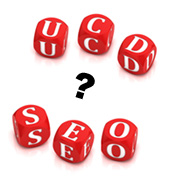User-Centered Or Usage-Centered Design: Which Is Better For SEO?
When creating a search-engine friendly website, do you follow the principles of user-centered design, usage-centered design, or both?
In one of my previous Search Engine Land columns, SEO Smackdown: Information Architecture vs. Technical Architecture, I reviewed some of the differences between IA and technical architecture. When our context is search engine optimization, is the primary focus on the user or the commercial web search engine? Or vice versa?
Some SEO professionals are more technology (search engine) focused. Some SEO professionals are more searcher focused…and there are various shades in between the two extremes.
When I train or consult clients on how Web documents more search-engine friendly for users, I often run into another dilemma: user-centered design vs. usage-centered design. At this point in time, I feel that SEO professionals lean heavily on usage-centered design.
Usage-Centered Design & Activity-Centered Design
Usage-centered design is a term coined by software developer and professor Larry Constantine and Lucy Lockwood that focuses on user intentions and usage patterns.
It is very similar to activity-centered design (ACD), which is also concerned more with the activities of users but not the characteristics of users.
I admit I was very excited when I first encountered the topic of usage-centered design. I grasped it immediately because, as an SEO professional, I am very focused on how people search.
Is the searcher behavior navigational, informational, transactional, commercial? What are the keywords that searchers genuinely type into the major Web search engines? What are the clickstreams?
Many SEO and analytics tools are built to identify, troubleshoot, and understand user behaviors and activities. In my opinion, I believe SEO professionals are light years ahead of usability professionals and information architects because they do not ignore or discount searcher activities. SEO professionals do not ignore findability as a facet of the user/searcher experience.
However, and I’ve said this many times over the years in conferences and articles, these tools show us searcher activities—how people search.
But they do not tell us why people search. And that is where user-centered design fits into the SEO equation.
User-Centered Design (UCD)
Now, as a usability professional (putting on my website usability hat right now – it’s not black), I absolutely understand the value of usage-centered design. If any of you have had to do any work with personas, you might know how difficult it might be to explain the need for them, identify them, and create them.
For example, I often have problems explaining personas and usability tests to a marketing team. A usability test is not a focus group, and a persona is not a market segment. CennyDD Bowles and James Box, co-authors of Undercover User Experience Design, explained the difference:
“Personas represent the other side of the marketing data coin. Segments cluster individuals into groups. Personas create individuals to represent groups.”
I have a confession to make. When I was first educated and trained on personas, I thought my instructors were full of hooha. I felt that they were more concerned with the personal characteristics of users rather than their behaviors and activities. I was dumbfounded that no one seemed to put searcher characteristics (newbie vs. expert, etc.) in their personas. And I did not understand why findability and SEO were discounted or ignored when creating relevant scenarios.
In other words, I was not a persona and user-centered design fan for quite some time.
Then I started conducting usability tests as both an observer and a facilitator. I was absolutely dumbfounded at how people performed tasks (different from me, at least). Keywords were ignored when formatted and positioned in various places on a webpage…and these keywords seemed so obvious to me. On the flip side, I was also gobsmacked at what keywords test participants did notice.
Ultimately, I grew to accept that when I designed or developed an interface, I should not create or conduct any usability tests because of my lack of objectivity. That entire learning experience was so eye opening.
I understand that many SEO professionals have limited knowledge and experience in website usability, information architecture, and user-centered design. I understand that my SEO journey is unique. Others become better SEOs by following a more technical path. Other SEOs become very skilled link developers and social media experts. All in all, I see that the field of search engine optimization has clearly been a part of usage-centered design.
What do you think? Is search-engine friendly design: user-centered design, usage-centered design, or both?
References
- Bowles, C. and Box, D. (2011). Undercover User Experience Design. Berkeley, CA: New Riders. Book website at https://undercoverux.com/.
- Constantine, L. and Lockwood, L. (1999). Software for Use: A Practical Guide to the Models and Methods of Usage-Centered Design. New York: ACM Press.
- Constantine L. Activity Modeling: Toward a Pragmatic Integration of Activity Theory with Usage-Centered Design, 2006. (PDF)
- Designing Web Applications for Use – User Interface Engineering article/interview.
Contributing authors are invited to create content for Search Engine Land and are chosen for their expertise and contribution to the search community. Our contributors work under the oversight of the editorial staff and contributions are checked for quality and relevance to our readers. The opinions they express are their own.
Related stories
New on Search Engine Land
